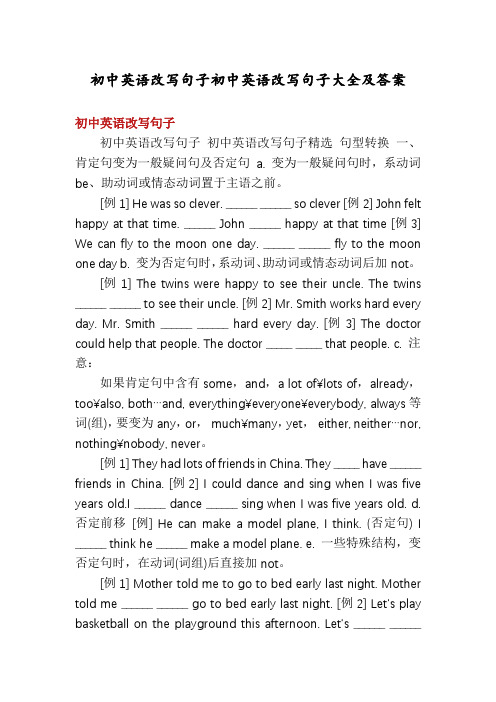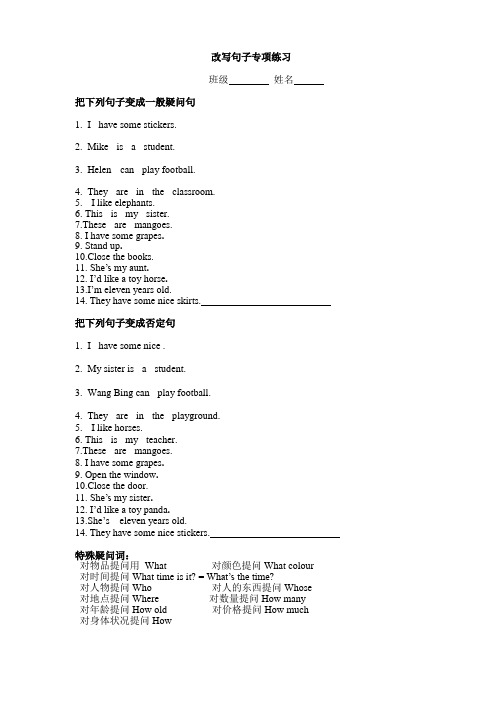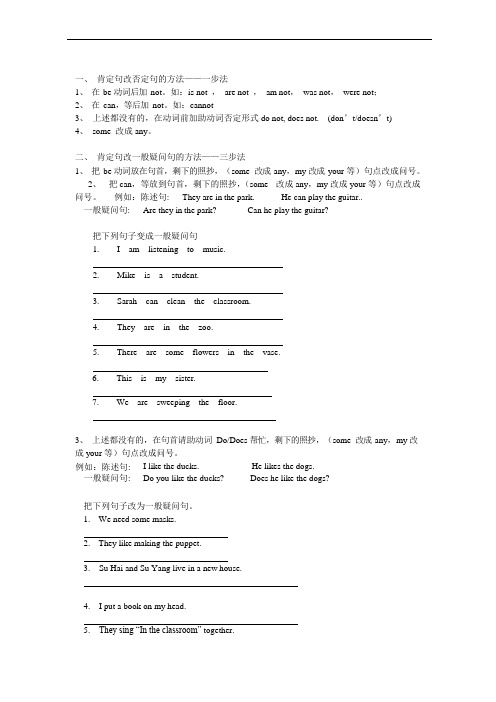一般疑问句,否定句改写
一般疑问句,否定句以及对划线部分提问的答题方法[1]
![一般疑问句,否定句以及对划线部分提问的答题方法[1]](https://img.taocdn.com/s3/m/4ead43cd9b89680203d8255b.png)
一般疑问句,否定句以及对划线部分提问的答题方法改为一般疑问句:1.先找am, is, are, was, were或can, would,放在最前面2.如果没有am, is, are, was, were或can, would,则看动词:(1)动词是过去式,句前加Did,动词变原形,其余照抄;(2)动词是第三人称单数,句前加Does,动词变原形,其余照抄。
(3)动词是原形,则句前加Do,其余照抄。
改为否定句:1.方法和上面一样,先找am, is, are, was, were或can, would,再后加not,其余照抄;2.如果没有am, is, are, was, were或can, would,则看动词:(1)动词为过去式,人后加didn’t,动词变原形,其余照抄;(2)动词为第三人称单数,人后加does n’t, 动词改为原形,其余照抄。
(3)动词为原形,则人后加don’t,其余照抄对划线部分提问:1.用适当的疑问词代替划线部分2.将剩余部分改为一般疑问句(注:如划线部分为主语,则用who代替,其余照抄;如划线部分为动词或动词短语,则用do代替,句前加what,再改为一般疑问句。
)学习小贴士:1.在be动词(is, am, are, was, were)或情态动词(can, may, must, should, would, could)后面加not,可以缩写成n’t. (情态动词后面动词用原形)如:I am a student. → I am not a student. (am not不能缩写)They are on the desk. → They are not on the desk.(are not = aren’t)2.在动词前加don’t, doesn’t, didn’t如:I have a pen.→ I don’t have a pen.She likes watching TV.→ She doesn’t like watch TV.(doesn’t后面用动词原形)We went to the park yesterday.→ We didn’t go to school yesterday. (didn’t 后面用动词原形) 3.祈使句的否定形式在句首在Don’t如: Open the door.→ Don’t open the door. (注意Don’t后面的单词开头字母不要大写)注:在改否定句时,如果句子中有some要改成any如:There are some birds in the tree.→ There aren’t any birds in the tree改一般问句和否定句要注意:☆ some 要变成 any如: There are some toys on the bed.→Are there any toys on the bed?☆第一人称(我)要与第二人称(你)互换如: I am at school now.→ Are you at school now? ( I 要变成you,所以be动词改成are)My father likes reading magazines.→ Does your father like reading magazines?对划线部分提问要注意:根据划线内容找出相对应的疑问词how和wh-词(what, when, where等),后面如有be动词或情态动词就跟be动词或情态动词,没有be动词或情态动词,后加do/does/did,划线部分的内容在问句中不出现。
句子改写-否定句和一般疑问句

句子改写——否定句、一般疑问句1. It is a big tiger.否定句____________________________一般疑问句2.We are sitting under the tree.否定句____________________________一般疑问句3.Mike and David are my cousins.否定句____________________________一般疑问句4.There is some milk in the glass.否定句____________________________一般疑问句5. There are some buses in the street.否定句____________________________一般疑问句6.I am having lunch in the kitchen.否定句____________________________一般疑问句7.We are playing the guitar on Sundays.否定句____________________________一般疑问句8.They are watching TV.否定句____________________________一般疑问句9.I can play the piano.否定句____________________________一般疑问句10.S he can make a nice cake.否定句____________________________一般疑问句11.They can go shopping on Saturdays.否定句____________________________一般疑问句12.I often play football after school.否定句____________________________一般疑问句13.They go to bed at 9:30.否定句____________________________一般疑问句14.I have a nice toy.否定句____________________________一般疑问句15.We like drawing.否定句____________________________一般疑问句16.I do my homework after school.否定句____________________________一般疑问句17.H e likes swimming.否定句____________________________一般疑问句18.S he likes listening to the radio.否定句____________________________一般疑问句19. Tom goes to school on Monday.否定句____________________________一般疑问句20. Sam does his homework every day.否定句____________________________一般疑问句21. My mum washes clothes every day. 否定句____________________________一般疑问句22. He usually has lunch at school.否定句____________________________一般疑问句23. I went to Shanghai last year.否定句____________________________一般疑问句24. We played soccer yesterday.否定句____________________________一般疑问句25. He saw a tall giraffe last Sunday.否定句____________________________一般疑问句26.H e gave me a lot of new books.否定句____________________________ 一般疑问句。
陈述句变一般疑问句和否定句

陈述句变一般疑问句和否定句一般疑问句=助动词+陈述句剩余部分否定句=找出助动词,在助动词后加not一、助动词:帮助动词构成时态、语态、感情色彩和否定疑问句。
它包括be动词, do的各种形态,have的各种形态,will等情态动词。
I am watching TV. am 在句子里不能独立做谓语,也没有具体的含义。
二、有的助动词既可以做助动词又可以做行为动词:be动词可以做行为动词,也可以做助动词。
行为动词是有实际意思,表示具体的动作,在句子里能够独立充当句子成分。
助动词是不具有实际意思,在句子里不能独立充当句子成分,只是帮助动词构成各种时态和语态三、学会通过助动词来判断谓语动词,来帮助读懂句子。
1、四类助动词,只有do是包含在谓语动词里的,其它的三个都是在谓语动词前面的。
2、很多助动词既可以做助动词又可以做实意动词。
当做助动词的时候,后面跟动词。
当做行为动词的时候,后面跟名词。
五、作业(一)用所给的词组成句子1、beautiful , a , she, pen, have1、he, rice, has , for , lunch.2、chicken, they , have, for ,rice, and ,lunch, tomatoes.3、school, after, Mary, goes, breakfast, to .4、in, a ,something, price, we, good , have.5、let, us, play, basketball6、believe, can’t, my, eyes, I7、are, goods, in, there, the, lots, shop, of8、how, T-shirt, how, is , your ?9、much, nice, are, these, how, socks?10、thirty-two, the ,are, dollars, books.11、good, the, many, a, colorful, coats, at, sells, price, shop.12、to, sister, loves, buy, my, Huaxing’s , on, T-shirts, sale.13、buys, Cindy, her, shop, some, from, flowers, this, mother.14、your, is, party, father’s, birthday, when?15、birthday, May, on, party, is, the, Jane’s, first.16、is, September, Nick’s, birth, Twenty-first, of, date.17、our, Kate, oldest, in ,is, class, the.18、your, how, old, is , brother?19、I, very, comedies, much, love.20、to, does, movies, want, see, she, a?21、my, Jack, actor, is, favorite.22、Beijing , I, Opera, I, movies, like, and, too, like .23、movies, do, what, you, kind, like, of?24、need, you, do, bags, sports, for25、much, game, how, is, the, computer.26、are, color, shoes, what, those27、his, have, sister, does, red, a, T-shirt28、likes, shoes, he, black, those(二)改写句子,变成一般疑问句和否定句。
初中英语改写句子初中英语改写句子大全及答案

初中英语改写句子初中英语改写句子大全及答案初中英语改写句子初中英语改写句子初中英语改写句子精选句型转换一、肯定句变为一般疑问句及否定句 a. 变为一般疑问句时,系动词be、助动词或情态动词置于主语之前。
[例1] He was so clever. ______ ______ so clever [例2] John felt happy at that time. ______ John ______ happy at that time [例3] We can fly to the moon one day. ______ ______ fly to the moon one day b. 变为否定句时,系动词、助动词或情态动词后加not。
[例1] The twins were happy to see their uncle. The twins ______ ______ to see their uncle. [例2] Mr. Smith works hard every day. Mr. Smith ______ ______ hard every day. [例3] The doctor could help that people. The doctor _____ _____ that people. c. 注意:如果肯定句中含有some,and,a lot of¥lots of,already,too¥also, both…and, everything¥everyone¥everybody, always等词(组),要变为any,or,much¥many,yet,either, neither…nor, nothing¥nobody, never。
[例1] They had lots of friends in China. They _____ have ______ friends in China. [例2] I could dance and sing when I was five years old.I ______ dance ______ sing when I was five years old. d. 否定前移[例] He can make a model plane, I think. (否定句) I ______ think he ______ make a model plane. e. 一些特殊结构,变否定句时,在动词(词组)后直接加not。
一般疑问句和否定句的改法 特殊疑问句改写

改写句子专项练习班级姓名把下列句子变成一般疑问句1. I have some stickers._______________________________________2. Mike is a student._______________________________________3. Helen can play football.________________________________________4. They are in the classroom.________________________________________5. I like elephants.________________________________________6. This is my sister._________________________________________7.These are mangoes.__________________________________________8. I have some grapes._________________________________9. Stand up._________________________________10.Close the books.________________________________11. She’s my aunt.________________________________________________12. I’d like a toy horse._______________________________13.I’m eleven years old. _____________________________________________14. They have some nice skirts.把下列句子变成否定句1. I have some nice ._______________________________________2. My sister is a student._______________________________________3. Wang Bing can play football.________________________________________4. They are in the playground.________________________________________5. I like horses.________________________________________6. This is my teacher._________________________________________7.These are mangoes.__________________________________________8. I have some grapes._________________________________9. Open the window._________________________________10.Close the door.________________________________11. She’s my sister.________________________________________________12. I’d like a toy panda._______________________________13.She’s eleven years old. _____________________________________________14. They have some nice stickers.特殊疑问词:对物品提问用What 对颜色提问What colour对时间提问What time is it? = What’s the time?对人物提问Who 对人的东西提问Whose对地点提问Where 对数量提问How many对年龄提问How old 对价格提问How much对身体状况提问How。
(完整版)小学英语一般疑问句、否定句和特殊疑问(附习题)(可编辑修改word版)

一、肯定句改否定句的方法——一步法1、在be 动词后加not。
如:is not ,are not ,am not,was not,were not;2、在can,等后加not。
如:cannot3、上述都没有的,在动词前加助动词否定形式do not, does not. (don’t/doesn’t)4、some 改成any。
二、肯定句改一般疑问句的方法——三步法1、把be 动词放在句首,剩下的照抄,(some 改成any,my 改成your 等)句点改成问号。
2、把can,等放到句首,剩下的照抄,(some 改成any,my 改成your 等)句点改成问号。
例如:陈述句: They are in the park. He can play the guitar..一般疑问句: Are they in the park? Can he play the guitar?把下列句子变成一般疑问句1. I am listening to music.2. Mike is a student.3. Sarah can clean the classroom.4. They are in the zoo.5. There are some flowers in the vase.6.This is my sister.7.We are sweeping the floor.3、上述都没有的,在句首请助动词Do/Does 帮忙,剩下的照抄,(some 改成any,my 改成your 等)句点改成问号。
例如:陈述句: I like the ducks. He likes the dogs.一般疑问句: Do you like the ducks? Does he like the dogs?把下列句子改为一般疑问句。
1.We need some masks.2.They like making the puppet.3.Su Hai and Su Yang live in a new house.4.I put a book on my head.5.They sing “In the classroom” together.6.We play basketball on Sundays.7.Tom likes listening to music三、肯定句改特殊疑问句的方法——四步法1、在一般疑问句的基础上,句首添加一个疑问词即可,可根据划线部分确定是什么疑问词。
肯定句,否定句,一般疑问句
am,is, are,can后面加上not,其余按顺序照抄。
肯定句变一般疑问句:把am,is, are,can提前放到句首并大写Am, Is,Are,Can,其例1:1)I am a boy.否定句:I am not a boy 一般疑问句:Are you a boy?Yes, I am/ No,I am not.2)He is a student。
否定句:He is not a student. 一般疑问句:Is he a student?3)There are many apples on the tree.否定句:There are not many apples on the tree。
一般疑问句:Are there many apples on the tree?4)They can swim。
否定句:They can not swim。
疑问句:Can they swim?do not或者does not,动词改原型,其余按顺序照抄.肯定句变一般疑问句:在句首加do或者does并大写,动词改原型,其余照抄。
例21)He goes to school. 否定句:He does not go to school。
疑问句:Does he go to school?2)They like eating apples. 否定句:They do not like eating apples. 疑问句:Do they like eating apples?练习:一。
将下列句子变成否定句、一般疑问句1 Mr Wang is thirsty。
否定句:__________________________一般疑问句: _______________________? 肯定回答:___________ 否定回答___________ 2。
The elephant’s ears are long.否定句:__________________________一般疑问句: _______________________? 肯定回答:___________ 否定回答___________ 3。
英语语法题:改写否定句和一般疑问句
1.It is a big tiger.否定句____________________________一般疑问句2.We are sitting under the tree.否定句____________________________一般疑问句3.Mike and David are my cousins.否定句____________________________一般疑问句4.There is some milk in the glass.否定句____________________________一般疑问句5. There are some buses in the street.否定句____________________________一般疑问句6.I am having lunch in the kitchen.否定句____________________________一般疑问句7.We are playing the guitar on Sundays.否定句____________________________一般疑问句8.They are watching TV.否定句____________________________一般疑问句9.I can play the piano.否定句____________________________一般疑问句10.S he can make a nice cake.否定句____________________________一般疑问句11.They can go shopping on Saturdays.否定句____________________________一般疑问句12.I often play football after school.否定句____________________________一般疑问句13.They go to bed at 9:30.否定句____________________________一般疑问句14.I have a nice toy.否定句____________________________一般疑问句15.We like drawing.否定句____________________________一般疑问句16.I do my homework after school.否定句____________________________一般疑问句17.H e likes swimming.否定句____________________________一般疑问句18.S he likes listening to the radio.否定句____________________________一般疑问句19. Tom goes to school on Monday.否定句____________________________一般疑问句20. Sam does his homework every day.否定句____________________________一般疑问句21. My mum washes clothes every day.否定句____________________________一般疑问句22. He usually has lunch at school.否定句____________________________一般疑问句23. I went to Shanghai last year.否定句____________________________一般疑问句24. We played soccer yesterday.否定句____________________________一般疑问句25. He saw a tall giraffe last Sunday.否定句____________________________一般疑问句26.H e gave me a lot of new books.否定句____________________________一般疑问句。
否定句、疑问句总结
句型转换:一般疑问句、否定句的变化规律要点精析一、陈述句该为一般疑问句或是否定句的变化规律1.当句中有be动词(am,is are)时,改成否定句时,在be动词后加not;改成一般疑问句时,把2.I would like to have some milk. (改成一般疑问句) ——————————————————————————3.They often go to the library on the weekend.( 改成一般疑问句) ——————————————————————————4.My friend go to school on foot. (改为否定句)——————————————————————————5.I am going to do my homework tomorrow.( 改成一般疑问句) ——————————————————————————6.Please read Lesson One.(改为否定句)_________ __________ Lesson One,please.7.Jackie has lunch at schoo1.(改为一般疑问句)_________ Jackie __________ lunch at school ?8. They go to bed early.(改为一般疑问句)________ they ________ to bed early?9. Mike does well in English. (改为否定句)Mike _______ _______ well in English.10.u Hai and Su Yang look the same.(改为一般疑问句)_______ Su Hai and Su Yang _______ the same?11. They studied at Guangzhou International school.(改为一般疑问句) _______ they _______ at Guangzhou International school?12. There is some water in the bottle.(改为一般疑问句)_______ there _______ water in the bottle?2.用情态动词的情况下有特殊情况。
译林版三上英语句型转换,很多孩子容易失分的地方,特意整理出来
三年级句型转换班级__________ 姓名______________一:仿照例子写句子:例:陈述句:She is a girl. 例:陈述句:She can run.否定句:She is not (=isn’t)a girl. 否定句:She cannot(=can’t )run.一般疑问句:Is she a girl?一般疑问句:Can she run?肯定回答:Yes,she is. 肯定回答:Yes,She can.否定回答:No,she isn’t. 否定回答:No ,she can’t1、She is my sister.2、He can dance.否定句:否定句:一般疑问句:一般疑问句:肯定回答:肯定回答:否定回答:否定回答:3、She is tall. 4.He can play football.否定句:否定句:一般疑问句:一般疑问句:肯定回答:肯定回答:否定回答:否定回答:例:陈述句:I am tall. 例子:陈述句:You are thin.否定句:I am not tall. 否定句You aren’t(=are not)thin.一般疑问句:Are you tall?一般疑问句:Are you thin?肯定回答:Yes ,I am. 肯定回答:Yes ,I am.否定回答:No,I am not . 否定回答:No,I am not1、I am a student.2、You are a teacher.否定句:否定句:一般疑问句:一般疑问句:肯定回答:肯定回答:否定回答:否定回答:3、I am fat.4、You are short.否定句:否定句:一般疑问句:一般疑问句:肯定回答:肯定回答:否定回答:否定回答:例:We are good friends. 例:They are tall.否定句:We aren’t (=are not)good friends. 否定句:They aren’t tall.一般疑问句:Are you good friends?一般疑问句:Are they tall.肯定回答:Yes,we are. 肯定回答:Yes,they are.否定回答:No,we aren’t. 否定回答:No ,they aren’t.1、We are thin.2、They are fat.否定句:否定句:一般疑问句:一般疑问句:肯定回答:肯定回答:否定回答:否定回答:二:根据例句改写句子。
- 1、下载文档前请自行甄别文档内容的完整性,平台不提供额外的编辑、内容补充、找答案等附加服务。
- 2、"仅部分预览"的文档,不可在线预览部分如存在完整性等问题,可反馈申请退款(可完整预览的文档不适用该条件!)。
- 3、如文档侵犯您的权益,请联系客服反馈,我们会尽快为您处理(人工客服工作时间:9:00-18:30)。
一般疑问句一般疑问句是疑问句的一种。
它是指用yes(是)或no(否)来回答的句子。
其结构是:系动词be/助动词/情态动词+主语+其他成分通常回答为:肯定:Yes,+主语+提问的助动词.否定:No,+主语+提问的助动词+not. 如:Are you from Japan﹖Yes I am./ No I’m not.Is her sister doing her homework now﹖Yes she is. / No she isn't.Does he work in a bank﹖Yes he does. / No he doesn't.Do you live near your school﹖Yes I do. / No I don't.Can you speak French﹖Yes I can. / No I can't.May I go home now﹖Yes you may. / No you mustn't.注意:1.将陈述句变为一般疑问句时,如句中有be 动词(am/ is/ are)时,可直接将它们提至主语前。
如主语为第一人称,应将其改为第二人称。
如:I’m in Class 2Grade 1.→Are you in Class 2Grade 1﹖We’re watching TV.→Are you watching TV﹖2.陈述句中有情态动词(can may must …)时,也可直接将它们提至主语前,即可成为一般疑问句。
如:He can swim now.→Can he swim now﹖The children may come with us.→ May the children come with us﹖3.陈述句中只有一个实义动词作谓语且其时态为一般现在时,变为一般疑问句时要在句首加do或does 主语后的实义动词用原形。
如:I like these animals.→Do you like these animals﹖She wants to go to the movies.→ Does she want to go to the movies﹖4.一般疑问句一般读升调(↑)5.一般疑问句有时不用yes或 no 回答。
如:Are they in town now﹖I think so.May I sit here﹖Certainly.Does he like soccer﹖Sorry I don't know.6。
一般疑问句的第一单词总是虚词,读的时候要读轻声.二、特殊疑问句以疑问词开头,对句中某一成分提问的句子叫特殊疑问句.常用的疑问词有:what(什么), who(谁), whose(谁的), which(哪个), when (何时), where(哪里), how(怎样), why(为何)等.特殊疑问句有两种语序:1.如疑问词作主语或主语的定语,即对主语或主语的定语提问,其语序是陈述句的语序:疑问词(+主语)+谓语动词+其他成分?如: who is singing in the room﹖whose bike is broken﹖2.如疑问词作其他成分,即对其他成分提问,其语序是:疑问词+一般疑问句语序? 如:what class are you in﹖What does she look like﹖Where are you from﹖What time does he get up every morning﹖How do you know﹖注意:1.回答特殊疑问句时,不能用yes / no,即问什么答什么,尤其是简略回答。
括号内是完整回答所需部分。
如:Who is from Canada﹖Helen (is from Canada).Where's the restaurant﹖(It is)Near the station.Why do you like koalas﹖(I like koalas)Because they are cute.2.特殊疑问句一般读降调(↓)。
改一般疑问句的方法一般疑问句,否定句以及根据答句写问句的答题方法改为一般疑问句:先找be动词(am, is, are),或can,放在句子最前面,如果没有则判断是否为第三人称单数(he/she /it/ Mike…),是则把动词改为原形,句前加Does,其余照抄。
还不是,则句前加Do,其余照抄。
改为否定句:方法和上面一样,先找be动词(am, is, are),或can,再后加not,其余照抄不是则判断是否为第三人称单数(he/she /it/ Mike…),是则把动词改为原形,人后加doesn’t,其余照抄还不是,则人后加don’t,其余照抄根据答句写问句的方法:①用适当的疑问词(who , whose , what , how, how many , when ,why)来提问,②将剩余部分改为一般疑问句(如果剩余部分为动词或动词短语,则用do代替,句前加what,再改为一般疑问句)一般现在时的句子结构:标志:usually , often , sometimes, everyday , always …句子结构: sb + V例如:I V原形He/ She/ It/ Mike/My mother… + V-s或 V-esYou/ We/ They /My parents… V原形Eg. Mike usually does sports at 4:30.We often go hiking on weekends.现在进行时的句子结构:标志:look, listen , now …句子结构:sb +be(am, is, are) + V ing例如:I amHe/ She/ It/ Mike/My mother… + is + V ingYou/ We/ They /My parents… a reEg. I am reading under the tree.She is cooking in the kitchen.疑问句、否定句句型变换测试题姓名:________ 分数:________按要求改写句子。
(2.5′× 40 = 100)1.She is in the kitchen. (改为一般疑问句)________________________________2.They are in the bedroom。
(改为否定句)________________________________3.Is it in the classroom? (作否定回答)________________________________4.Are they near the desk?(作否定回答)________________________________5.My books are in the bag. (就划线部分提问)________________________________6.It is time to go to school。
(变成否定句)________________________________7.Tom watches TV every evening. (改为否定句)________________________________8.I do my homework every day。
(改为一般疑问句,作否定回答)__________________________________________________9.She likes milk。
(改为一般疑问句,作肯定回答)__________________________________________________10.John comes from Canada. (对划线部分提问)________________________________11.She is always a good student. (改为一般疑问句,作否定回答)__________________________________________________12.Peter and Joy like going skating。
(改为否定句)________________________________13.I’d like some juice. (对划线部分提问)________________________________14.I’d like to go swimming. (对划线部分提问)________________________________15.I’m in the park. (对划线部分提问)________________________________16.I’m interested in dancing。
(改为一般疑问句)________________________________17.She is not good at drawing. (变为肯定句)________________________________18.Today is Saturday. (对划线部分提问)________________________________19.There are seven days in a week. (对划线部分提问)________________________________20.We have PE class on Tuesday。
(对划线部分提问)___________________________________________________22.We go to school every morning。
(改为否定句)_____________________________________23.He speaks English very well. (改为否定句)_____________________________________24.I like taking photos in the park。
(对划线部分提问)_____________________________________25.My father is a teacher。
(对划线部分提问)_____________________________________26.I will make the bed. (改为一般疑问句)_____________________________________27.Can you clean the tables and chairs? (作否定回答)______________________________________28.We can go there by coach. (对划线部分提问)______________________________________29.I am ten years old。
